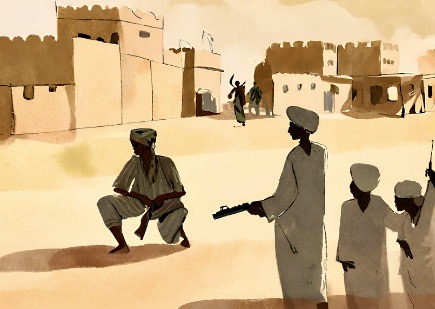Blog: Life in the capital, a year of life in a war zone
30 April 2024
For over a year, Sudan’s capital, Khartoum, has been the scene of a war zone where residents miraculously survive despite a myriad of obstacles. Ayin’s correspondent writes a compelling, first-person testimony of surviving in southern Khartoum.
Staying amidst the fighting in Khartoum was not a voluntary decision; some residents found themselves forced to live in their homes due to their inability to afford to travel to safer states. Many in Khartoum were compelled to close their businesses due to the war, others were looted and lost everything.
The extreme prices of rent and the high cost of living in the safer states also prevented many people from moving to those states. Others in Khartoum did not anticipate the conflict to continue for more than a few days, and displacement was not something they even considered.
As the war prolonged, the violence escalated, and with the worsening security situation, lots of people surrendered to living in their homes under harsh humanitarian conditions.
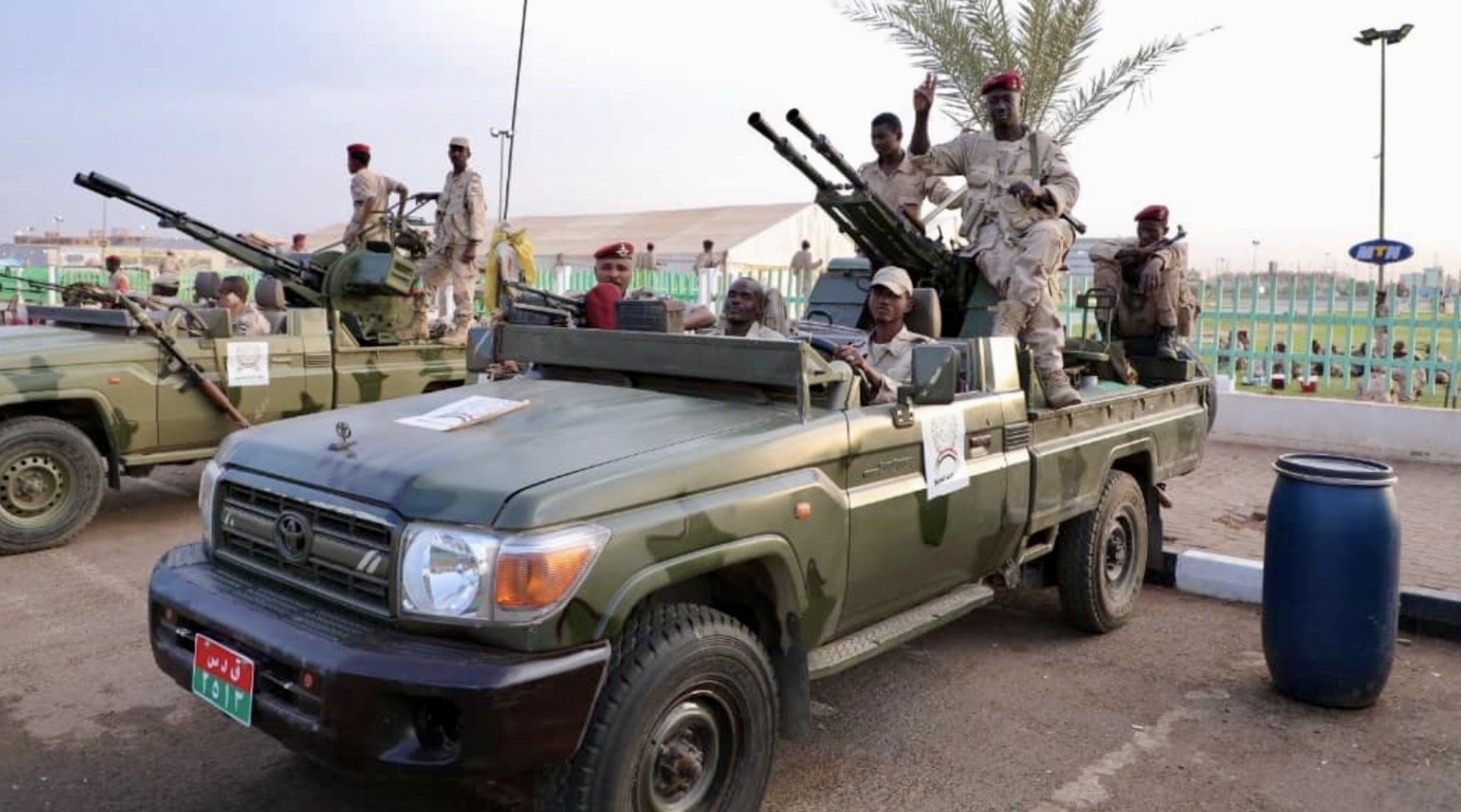
Fighting for Survival
Despite the high cost of displacement, most of Khartoum’s residents left for other states, yet those who could not remained stuck in the war zone in Khartoum, one of the three cities of the Sudanese capital. They had to come up with ways to survive the exceptional conditions, and as security was their greatest concern, the priority was forming teams of young people to guard homes and property. Teams of youth emerged, determined to provide a small modicum of protection against the rising number of armed groups; especially members of the Rapid Support Forces.
The painful reality prompted the stranded residents to invent coping methods. They resorted to communal living; men would gather in the neighbourhoods under the shade of trees and women inside homes, they would cook whatever food they had in the courtyards and eat it collectively. This became the lifestyle of all the people left behind in the Sudanese capital, especially in the southern Khartoum area.
Citizens have allocated designated places for cooking and eating, so those who are well off bring the food they have to share with the less fortunate twice a day. This act of solidarity restored social cohesion among all people as they all became equals.
All the stranded residents have lost the luxury of choosing food; their daily meals are made from lentils and rice. However, they may lose the ability to afford them after a steady rise in their prices. The price of a kilo of lentils rose from 1,000 to 2,500 Sudanese Pounds (SDG). The rest of the commodities are witnessing a similar increase, as the price of a bag of wheat flour jumped in a short period from 25,000 to 35,000 SDG.
Most of the original merchants of the markets in southern Khartoum fled due to the conflict, while newcomers affiliated with the Rapid Support Forces (RSF) took control of the stores to sell stolen goods. Burgled possessions are also widely traded, and they are offered for a low price compared to their real price in what is known as “Dagalo” markets.
The lucky few citizens who manage to hold onto their possessions, relocating to a safer area, incur expensive “transit permits” from the RSF as well as invoices proving their ownership of the possessions. The RSF and their affiliates are free to transport any stolen property.
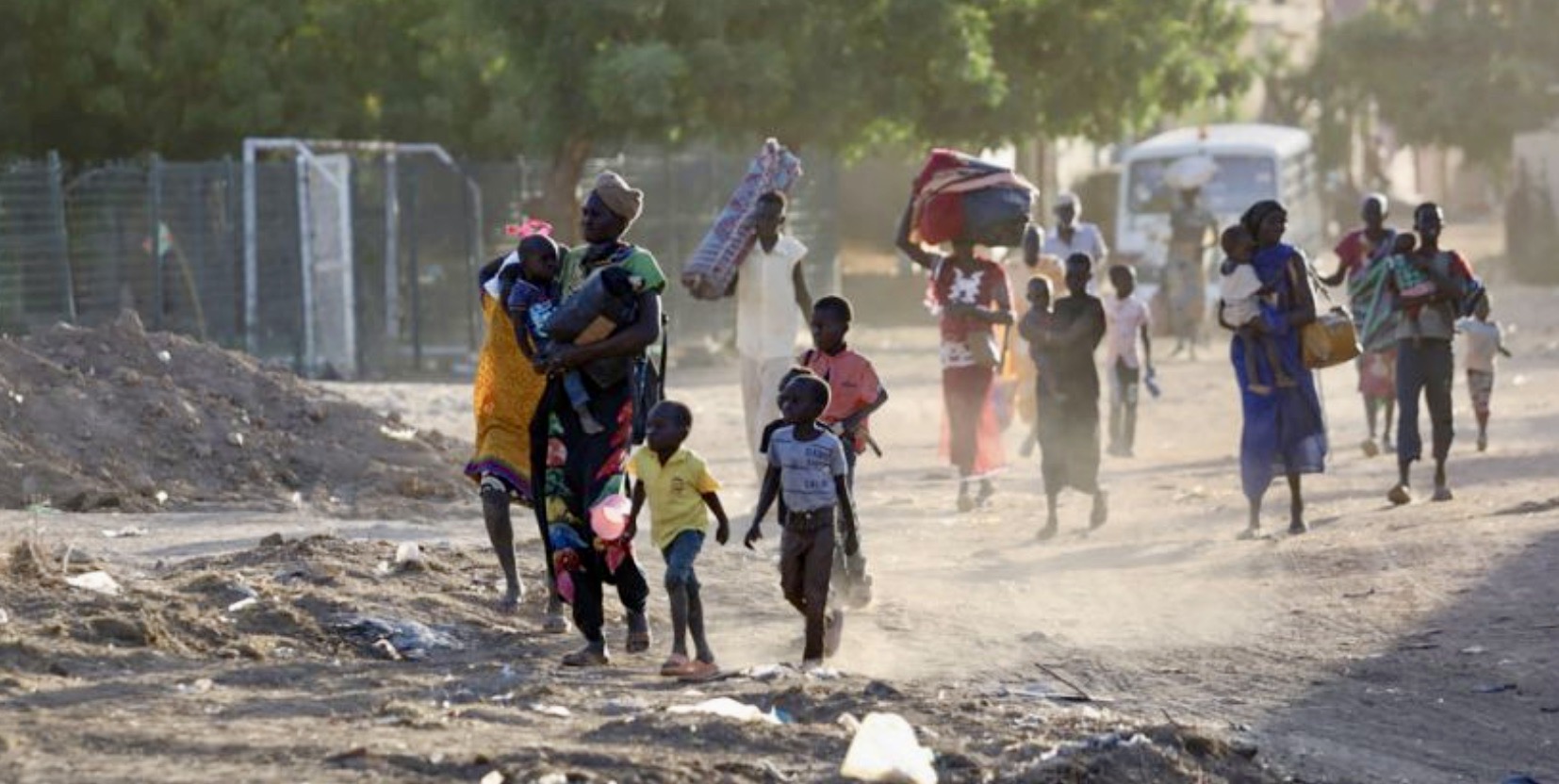
Alternative solutions and extortion
Since the outbreak of war, the salaries of the employees stranded in war zones have stopped, forcing them to look into new sources of income. Some resorted to making charcoal out of firewood, and others found a way to make ends meet by working simple jobs in the markets. But even if they manage to earn anything, this small income is often stolen.
Some people started planting limited areas inside or near their homes with vegetables to feed their families and sell the excess harvested.
Lots of those stuck in Khartoum depend on cash assistance sent by their loved ones who live abroad or in safer states via banking applications such as “Bankak”, yet due to the complete closure of banks, and after the interruption of communications and Internet service last February, the suffering of citizens in conflict areas in Khartoum has worsened.
During the communications blackout, members of the RSF introduced “Starlink” satellite internet devices to some regions and offered the service to citizens at the price of 3,000 Sudanese pounds per hour, an unaffordable rate for people who lost their jobs and incomes. Similarly, any financial transfer incurs a hefty fee by the RSF, sometimes reaching 20% of the total.
Many people lost large sums of money due to the widespread printing of counterfeit currency. I remember a citizen once losing 50,000 SDG because of this practice, yet he did not return the forged cash to the armed RSF trader as he feared for his life.
On top of all of this, it is not safe to move around the city, especially while carrying money, as RSF militants target people and rob them at gunpoint. Some of them follow people in the market after they receive money transfers and loot them. Residents now go to the market in groups to reduce the risk of getting robbed, and also to avoid arbitrary arrest and enforced disappearance.
Due to the absence of transportation, bicycles became key means to move around and carry things, in addition to some small buses and worn-out cars that survived the extensive looting operations carried out by RSF soldiers.

Trapped
Neither land nor air is safe for civilians in southern Khartoum. We find ourselves besieged by indiscriminate airstrikes from the Sudanese army, and violations and attacks by the RSF that control the area on the ground.
At the beginning of April, armed men stormed a house in the southern Khartoum area and opened fire on the family inside. The father died instantly, and one of his sons was injured by a bullet in his thigh. Similar incidents were repeated in neighbouring areas, which ended the hopes of citizens wishing to return to their homes.
RSF also carried out widespread arrests of civilians, detaining them in special lockups after accusing them of being Islamists or members of the security forces. The detainees are subjected to beatings and torture and are tied with ropes without regard to their human dignity, age, or medical conditions.
In their search for money, cars, and other possessions, RSF militants continuously raid citizen’s homes in southern Khartoum, subjecting them to various types of torture, including beating them with sticks and shooting them, which led to many deaths and injuries.
As the areas under RSF’s control have become almost devoid of civilian-owned cars, people are forced to transport the dead in public transportation vehicles (buses), where the bodies are placed on seats to reach the cemeteries, or via rickshaws, and in times people have to use taxis driven by RSF militants.
It seems that the RSF have established secret detention centres to detain citizens. Many people have disappeared, -leaving their families with no idea where they are or the condition they are in. Even the RSF members in the neighbourhoods do not know the whereabouts of the detainees. The arrests of citizens are carried out through alleged legal reports from the RSF, despite the absence of judicial bodies operating in the region. Civilians are also arrested from inside their homes during unlawful raids.
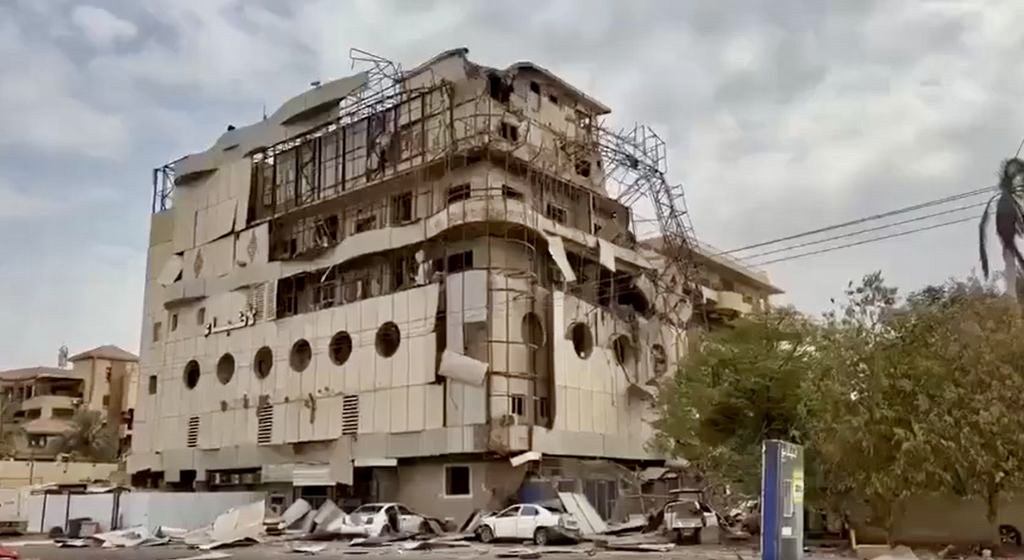
Deterioration of services
In addition to the mass human rights violations, residents in southern Khartoum face a severe deterioration in services, especially electricity. Some electrical outages have lasted seven months, as the armed clashes destroyed poles and transmitters.
Another reason for the prolonged blackouts was that RSF soldiers stole the oils used for electrical transmitters and used them in fraudulent operations by mixing them with gasoline and selling them as fuel. In documented cases, some militants even sold them to civilians as cooking oil.
Without power, water supplies diminished due to the lack of pumping. Some residents must risk their lives on a daily basis in pursuit of potable water.
The majority of hospitals and medical facilities have also stopped functioning; only three centres remain in operation, all organised by ERR volunteers. There are three hospitals: Bashaer Hospital, Turkish Hospital in the Al-Kalakla suburb, and Martyr Centre in Al-Qatiya –all overstretched, short-staffed, and struggling with medicine shortages.
The suffering of patients with chronic diseases has doubled due to the lack of medications. Power outages have also made it difficult to preserve the few medicines that remain available.
There are some patients in the southern Khartoum region who succumbed to their diseases because they could not access medical care in a timely manner. There are also some cases that required high-level medical interventions that are not available in the afflicted capital, so they died before being able to travel elsewhere.
Animals and birds were not spared the misery of war either, as they suffer from hunger and thirst. Lots of them died, and their bodies were scattered in the area, especially dogs and cats. Stray dogs now prey on cats.
In turn, the owners left the trees, and the lack of water caused many of them to wither and die in southern Khartoum. Stranded citizens initiated campaigns to water these trees – some of which are fruitful, in an attempt to save them.
In addition to dehydration, trees suffer from unjust cutting, as some citizens have resorted to producing charcoal either to sell or to use as an alternative to cooking gas. The RSF seized warehouses of gas cylinders in the Al-Shajara area, south of Khartoum. The militia sells gas in the markets, but civilians refuse to buy it as they know that it was stolen.

Endangering Children
Children in the war zones are more affected than others. They suffer both physically and mentally due to the war and are more vulnerable to malnutrition and diseases.
Among the initiatives in southern Khartoum to help children are educational courses to assist them in continuing their learning process and help them return smoothly to classrooms after the end of the war. However, the lack of sufficient educational means and the severe shortage of teachers, most of whom were forced to flee, hinder the progress of this initiative.
Efforts continue to alleviate the effects of war on children in the warzone by creating sports programmes such as regular football exercises and matches, which have been instrumental in distracting children from thinking about the fighting and the terrifying sounds of artillery and aircraft bombardment that accompany it.
The culture of war has spread among children as they learn to distinguish the sounds of different weapons, including fighter jets’ sounds; you find them naming planes by their model the moment they fly over them.
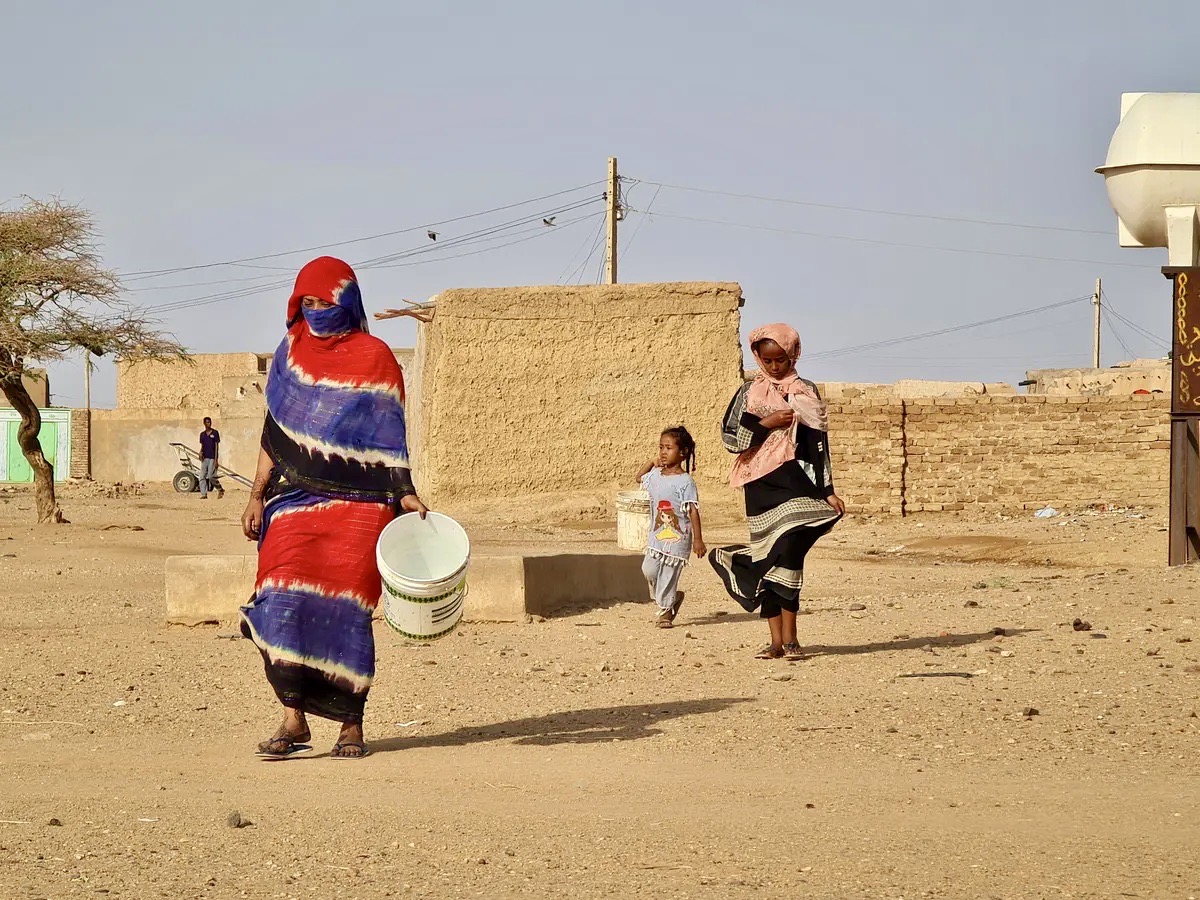
Fears and Wishes
Residents in southern Khartoum have paid a heavy bill for this war, which has been ongoing since mid-April 2023, like other Sudanese in other conflict areas. They live in dread that the fighting will continue for a long time, prolonging their torment.
The residents in that area face their hardships in silence, while no humanitarian aid has been able to arrive from organisations since the beginning of the conflict due to security issues. The sole aid comes from the ERRs, where young volunteers work hard to provide some food through the “food baskets” and kitchen projects.
Despite the bleakness of the scene, the residents of southern Khartoum themselves hope that the war stops soon to end their struggle. They see themselves as the weakest link in this war, which they did not contribute to yet they pay the heaviest price for it.
The two warring parties to the fighting do not uphold international humanitarian law or international treaties such as the four Geneva Conventions regarding the protection of civilians during armed conflict. The civilians silently hope that all of the perpetrators of all the horrendous crimes will be held accountable, and that all those affected will, one day, find justice.


